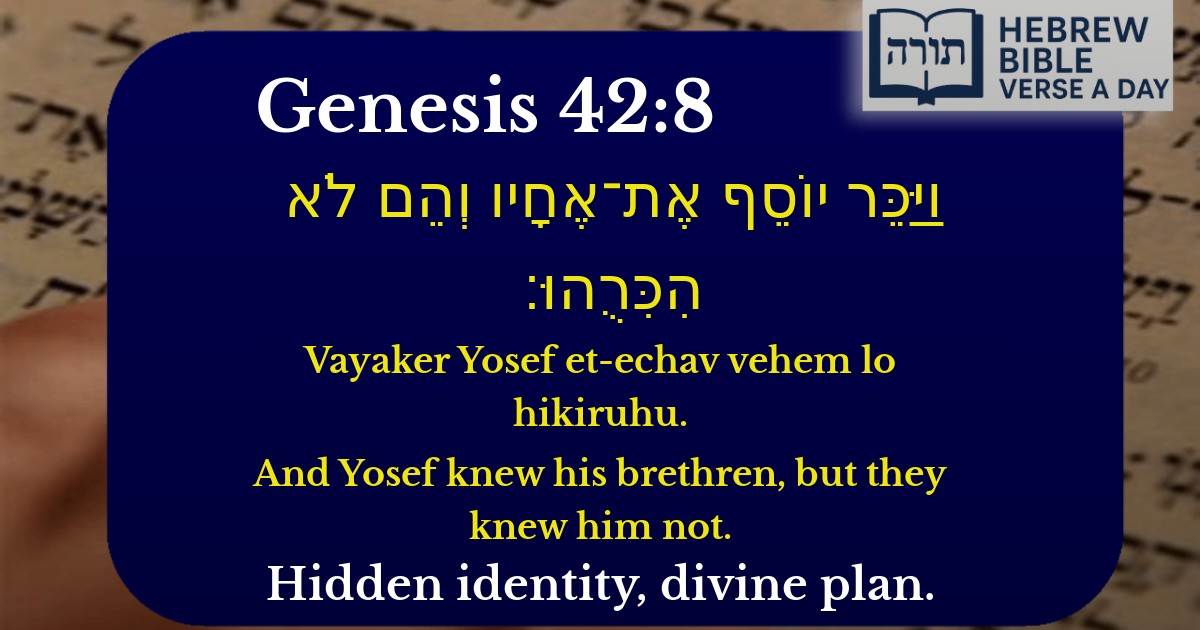Frequently Asked Questions
Q: Why didn't Yosef's brothers recognize him?
A: According to Rashi, Yosef's brothers didn't recognize him because he had left them as a beardless youth and now appeared as a mature man with a full beard. Additionally, the Midrash (Bereishit Rabbah 91:7) explains that when they last saw Yosef, he was a Hebrew shepherd, but now he appeared as an Egyptian ruler speaking through an interpreter.
Q: Why did Yosef recognize his brothers but they didn't recognize him?
A: The Talmud (Chullin 91b) explains that Yosef recognized his brothers because he had last seen them with beards (as adult men), so their appearance hadn't changed significantly. However, they had last seen him without a beard (as a youth), so his now bearded appearance made him unrecognizable. Additionally, Yosef was expecting to see his brothers, while they had no reason to expect to see Yosef in Egypt.
Q: What lesson can we learn from Yosef recognizing his brothers but them not recognizing him?
A: The commentators teach that this situation demonstrates how people can fail to recognize truth even when it's right in front of them. The Kli Yakar notes this shows how Divine Providence works in hidden ways - Yosef's rise to power was all part of Hashem's plan, though his brothers couldn't perceive it at first. It teaches us to look beyond surface appearances to recognize Hashem's hand in events.
Q: How could Yosef speak Egyptian if he was Hebrew?
A: The Torah tells us Yosef became completely fluent in Egyptian language and culture during his years there. According to Ramban, Yosef's ability to speak Egyptian perfectly and his adoption of Egyptian dress and customs (like shaving, which Hebrews didn't do) further prevented his brothers from recognizing him. His transformation was so complete that they thought he was a native Egyptian leader.
Q: Why is this moment important in the Torah's story?
A: This moment marks the beginning of the fulfillment of Yosef's dreams from earlier in Genesis. As the Malbim explains, this unrecognized encounter sets in motion the process of repentance and reconciliation between Yosef and his brothers. It's a crucial turning point where the brothers, who once sold Yosef, now unknowingly stand before him in need, beginning their path to teshuvah (repentance).


Recognition and Concealment
The verse (Bereshit 42:8) states: "וַיַּכֵּר יוֹסֵף אֶת־אֶחָיו וְהֵם לֹא הִכִּרֻהוּ" ("And Yosef knew his brethren, but they knew him not"). Rashi explains that Yosef recognized his brothers because when they last saw him, he was without a beard, whereas now he had a full beard. Conversely, the brothers did not recognize him because when they last saw him, he was beardless, and now he appeared as a mature, bearded Egyptian ruler.
Spiritual Dimensions of Recognition
The Midrash (Bereshit Rabbah 91:7) delves deeper, suggesting that Yosef recognized his brothers spiritually—he perceived their moral and familial bonds—while they failed to recognize him because they were spiritually distant from him at that moment. The Seforno adds that Yosef's disguise as an Egyptian viceroy, complete with royal garb and demeanor, further obscured his identity from them.
The Role of Divine Providence
Ramban (Nachmanides) emphasizes that this moment was orchestrated by Divine Providence (hashgachah pratit). Yosef's concealment was necessary to set in motion the events that would lead to the fulfillment of his dreams and the eventual reconciliation and sustenance of the family during the famine. The brothers' lack of recognition was part of a larger divine plan to bring about teshuvah (repentance) for their earlier actions.
Psychological and Emotional Layers
Halachic and Ethical Implications
The Talmud (Chagigah 4b) derives from this verse the principle that one should not judge a person based solely on outward appearances, as the brothers failed to recognize Yosef due to his changed exterior. This teaches the importance of looking beyond superficial traits to perceive the true essence of an individual.